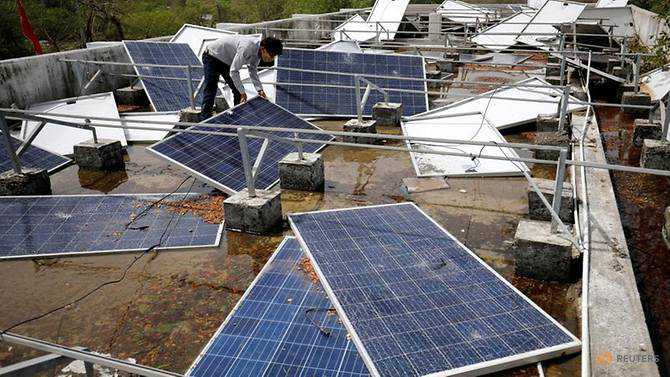India cyclone death toll jumps as navy looks for dozens missing
20 May, 2021

The number of casualties from a significant cyclone that slammed into India jumped to at least 87 on Wednesday (May 19) as the navy sought out 65 persons still missing, increasing the country's woes as it suffered a record number of COVID-19 deaths.
Cyclone Tauktae, which pummelled the western coast later Monday and left a good trail of destruction, was the latest in what specialists say is an increasing number of ever-greater storms found in the Arabian Sea as a result of climate transformation warming its waters.
The defence ministry said Wednesday that Navy ships had rescued a lot more than 600 people after waves up to 8m high hammered offshore oil installations.
But 22 bodies were as well recovered while planes and helicopters were even now searching for 65 personnel missing in one of more than a few support vessels that slipped its moorings in the storm and sank.
M.K. Jha, head of the Naval Western Order, said the ocean was so rough that they cannot board life rafts.
Those rescued have "hope in their eyes but certainly, they are distressed ... they have already been battered by the ocean conditions for multiple time," Jha informed the NDTV news channel.
'LUCKY TO BE ALIVE'
"We happen to be lucky to be alive," one particular crew member told AFP after he disembarked from a navy destroyer in Mumbai.
"The Indian Navy was a godsend for us. They arrived in the nick of time. We had been clinging onto the barge and luckily the life span jackets helped us as the drinking water was exceeding our mind," he added.
Others told AFP they jumped from the vessel when they realised all eight anchors had broken found in the ferocious storm.
Even prior to the cyclone built landfall in Gujarat express, with gusts up to 185km each hour, associated big rains and strong winds killed about 20 people in western and southern India.
Gujarat officials said Wednesday that the death toll in the state following the storm had risen to 45, with many killed by collapsing houses or perhaps walls and even more fatalities expected.
"I have hardly ever experienced such strength in my own life," said a good hotel owner found in the town of Bhavnagar where in fact the winds smashed windows on the seafront and sent trees and electricity lines toppling.
Some 238,000 persons remained in shelters with an increase of than 16,500 houses damaged and practically 70,000 trees uprooted. Engineers were working to restore power to thousands of people.
More than 15 % of the full total yearly development of salt found in Gujarat - India's biggest producer of the mineral - was either washed away or perhaps unable to be harvested due to flooding, the Indian Salt Manufacturers Association told AFP.
At least twelve endangered blackbuck Indian antelopes, and an unknown quantity of birds that nest around individual habitation, have died, Gujarat's chief wildlife warden Shyamal Tikadar told AFP.
A lot more than 600 farm pets or animals including cows, buffalos and goats, were likewise killed, officials added.
Primary Minister Narendra Modi tweeted his authorities was "performing closely with all the current states damaged by the cyclone", carrying out a survey of the destruction in his home talk about of Gujarat.
He announced school funding for the region, as well as for the groups of the victims and the ones injured.
COVID-19 CRISIS
Although the cyclone was among the fiercest in decades, better forecasting than in previous disasters meant that 200,000 people in peril zones - including a huge selection of COVID-19 patients - were moved to safety.
The deadly weather system hit as India's healthcare system struggled with a coronavirus surge that in the past 24 hours killed an archive 4,529 people.
"This is probably the most powerful cyclones we've faced found in India for many years, and after weeks of chaos and devastating loss of life due to COVID-19, it could not have come at a good worse period," said Santanu Chakraborty of the charity Save the kids.
The Arabian Sea previously experienced fewer severe cyclones compared to the Bay of Bengal but rising water temperatures as a result of global warming was changing that, experts say.
Source:
